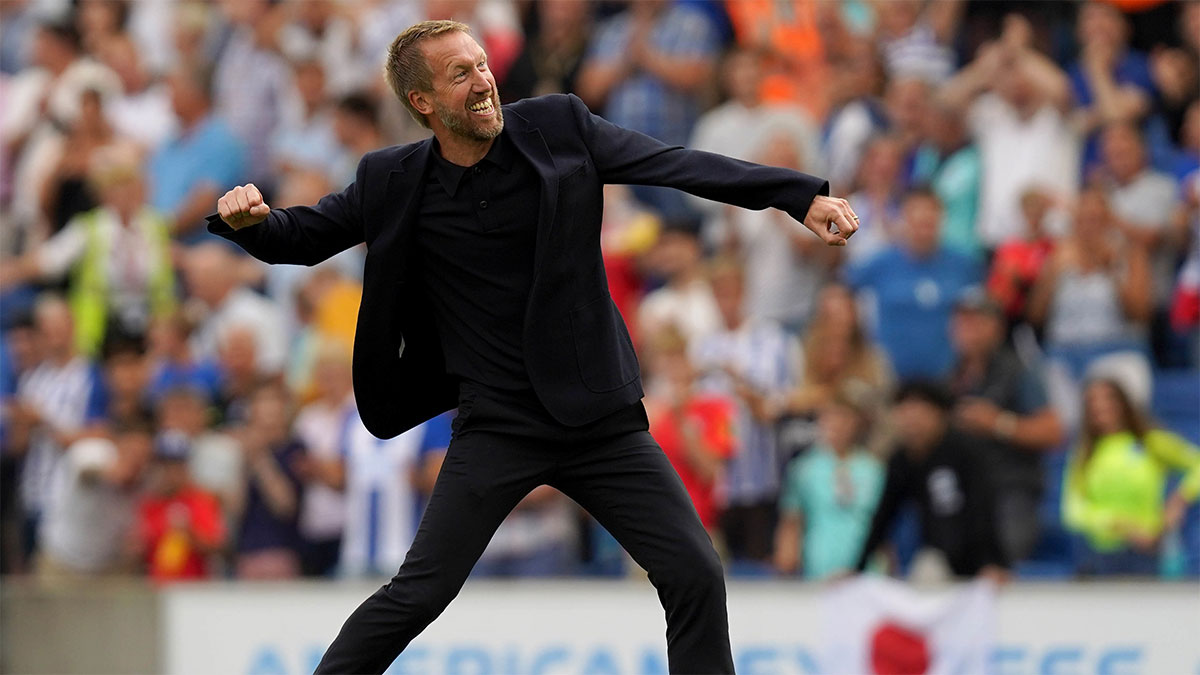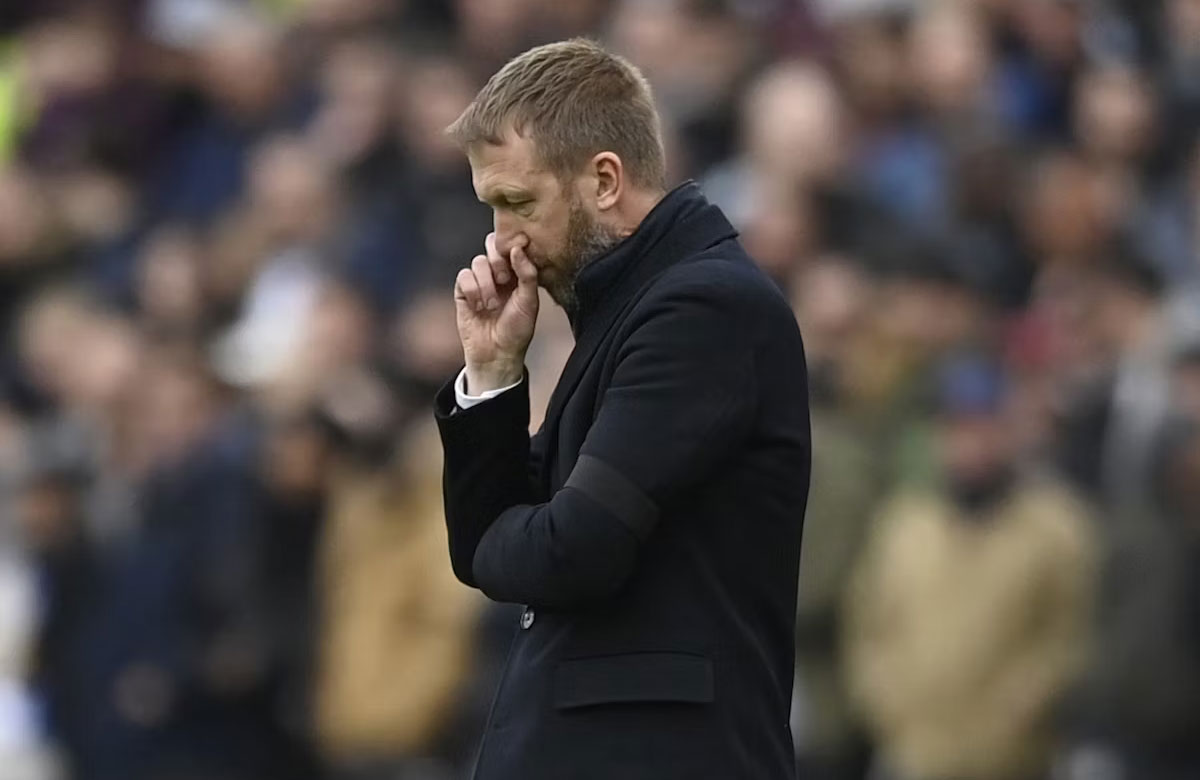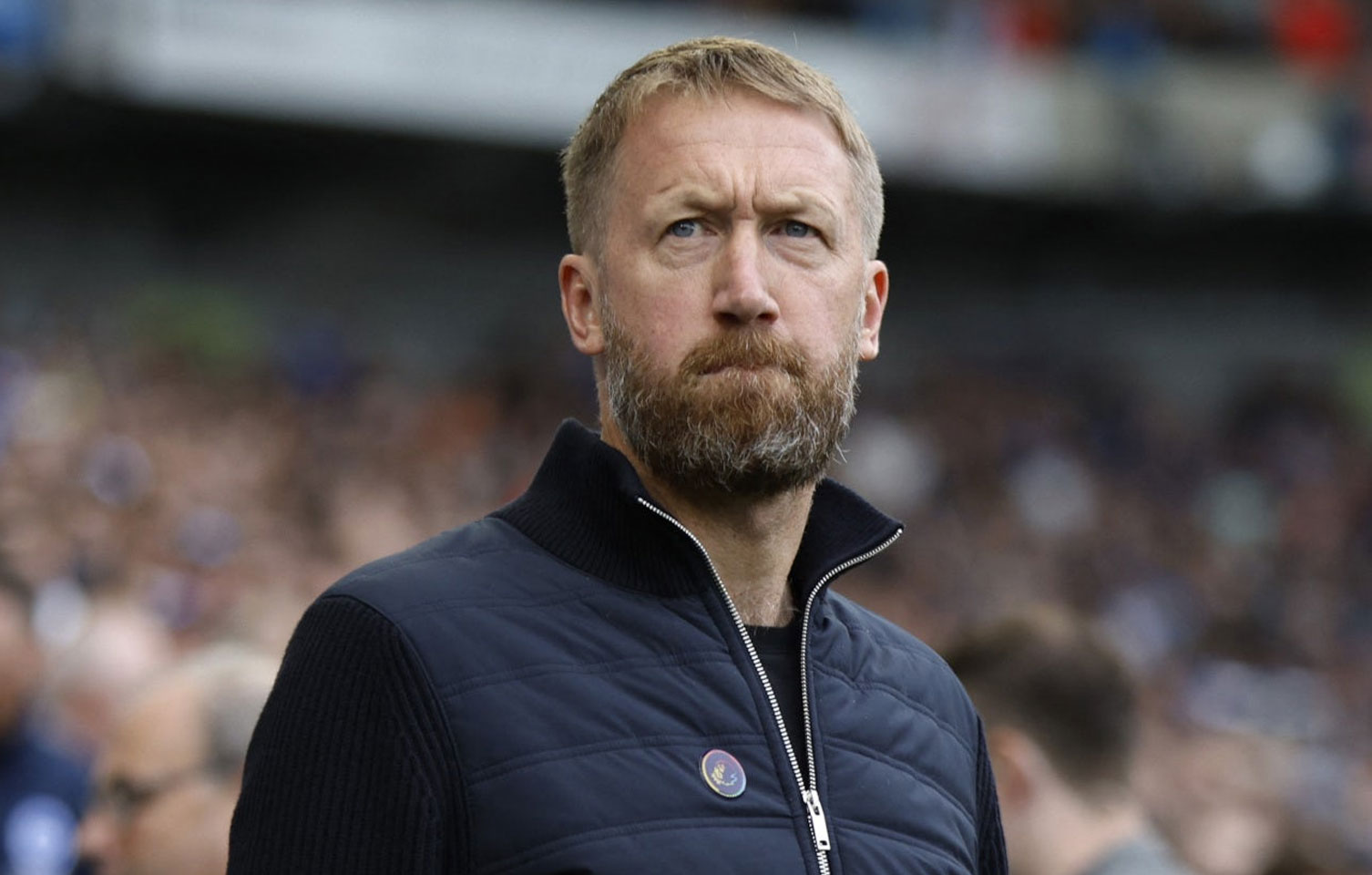Graham Potter would be an unlikely ‘quick-fix’ option for Everton
Speculation surrounding Sean Dyche and who might replace him bubbles away on social media, discussion forums and in the betting markets, but if results between now and the New Year demand a swift change in manager, it's unlikely a man for whom the word “build” is foundational to the way he works would be the short-term answer
As Sean Dyche struggles to keep Everton’s collective heads above water while the Club and fans alike await the ratification of The Friedkin Group’s buyout of Farhad Moshiri’s majority stake, talk continues to swirl around the manager’s future and to whom the Blues might turn if the new owners feel compelled to make a big decision before they’ve even managed to get their feet under the table.
Confirmation of TFG’s takeover is expected to come this month but what Evertonians hope will be the final days of waiting for change at the top of their club coincides with a daunting run of games, one that was supposed to pit them against all of the current four teams in the Premier League until the Goodison Derby was postponed due to Storm Darragh.
That delay was either a reprieve for Dyche, who now only has to contend with Arsenal, Chelsea and Manchester City between now and Boxing Day, or it robbed him of a chance to pull off a repeat of April’s barnstorming win over Liverpool. There’s a case to be made either way — the Reds have been in frightening form this season and were nine points clear going into their 3-3 draw at Newcastle, a result that was something of an aberration for Arne Slot and his side, but they would have been without seven first-team players had the Derby gone ahead.
In the meantime, results, not least their own against Wolves, have ensured that Everton retain a five-point cushion between themselves and the relegation zone. Southampton remain rooted to the bottom thanks to defeats by Chelsea and Aston Villa; Ipswich Town lost successive games at home to Crystal Palace and Bournemouth and still await a first win at Portman Road since coming back up; and Gary O'Neil appears to be on the precipice at Wolves following two more defeats.
Leicester City, however, are showing signs of life and have picked up four points from six so far this month. Either Ruud van Nistelrooy is enjoying a “new manager bounce” or the Foxes, like Newcastle and Villa before them with the appointments of Eddie Howe and Unai Emery, are showing Everton the way in terms of what a new hire can bring.
In the background, the speculation surrounding Dyche and who might replace him bubbles away on social media, discussion forums and in the betting markets, even if the Kettering-born coach has slipped to sixth in the “sack race” among odds makers, behind Howe himself, Russell Martin, Ange Postecoglu, Julen Lopetegui and O’Neil.
The chatter continues, however, in a vacuum of any information over whom the Friedkins might target should they feel that Dyche’s position is either untenable or they want to get a jump on getting a new man in charge to start re-building the Club as soon as they get in the door.
David Moyes, an obvious option on a short-term contract to navigate the remainder of the campaign and see the Toffees into the new stadium at Bramley-Moore Dock, is a 3/1 shot; former Blues midfielder Lee Carsley is 7/1; Michael Carrick, currently turning heads at Middlesbrough, has been mentioned; Steve Cooper, just ousted by Leicester, is either a red-hot favourite or an also-ran depending on which market you track; and Sérgio Conceição, out of work since leaving Porto in the summer, isn’t even considered a factor.
One name that is consistently among the names mentioned though is Graham Potter who has been on something of a sabbatical since being unceremoniously sacked by Chelsea in April 2023. Like Dyche in the weeks before he was appointed by Everton, the former Swansea and Brighton boss has stepped back into the limelight after taking time to take stock with some punditry work on Amazon Prime when he announced that was “open to everything” in terms of his next move.
His re-emergence has coincided with crises of form at Leicester (he reportedly turned down the chance to take the helm at the King Power Stadium and didn’t fancy taking the reins at Ajax either), West Ham and RB Leipzig and there’s a good chance that the 49-year-old will be hired by another club long before there is a vacancy at Goodison Park.
There’s an argument to be made that that is just as well, particularly if the idea is to bring in someone to get results quickly and move the Club away from the lower reaches of the table.
Born in Solihull, Graham Potter had a “journeyman” career as a player that took him from Birmingham City to Stoke, West Bromwich Albion and York City, with a brief stint in between at Southampton that gave him his only exposure to top-flight football in the late 1990s.
A left-back by trade, he hung up his boots in 2005 after a season at Macclesfield Town but he was already preparing for life after playing football with an Open University degree in Social Sciences. Roles as football development manager for the University of Hull and technical director for the Ghanaian women’s team followed before he joined Leeds University as an assistant coach where he completed a Masters degree in leadership and personal and professional development.
That led to his first managerial appointment in 2008 at Leeds Carnegie of the Northern Counties East League and in December 2010, apparently on the recommendation of former Everton Assistant Manager, Graeme Jones, Potter was handed a role by Swedish fourth-term outfit, Östersund.
Potter’s achievements at ÖFK were remarkable. He led them to back-to-back promotions in his first two seasons in charge and by 2015 he had the small club in what was, for them, the completely unchartered territory of the Allsvenskan, Sweden’s top flight, for the first time.
He guided them to the Swedish Cup in 2017 and a first appearance in European competition as a result, which led to an acclaimed victory over Galatasaray in the qualifying rounds and an even more famous triumph over Arsenal at the Emirates Stadium later in the competition, although a defeat on aggregate to the Gunners ended their fairytale run.
“It was probably the biggest challenge I’ve had in my life,” Potter said of his experience in Sweden in an interview long before his travails at Chelsea. “The first six months were really tough because you’d relocated with your family and you had to adapt to a new life, a new culture, a new country.”
Potter’s success at Östersund made it almost inevitable that clubs in the UK would eventually come calling, which Swansea City did in 2018, hoping that the Midlands native could lead them back to the Premier League. In what has become a hallmark of his career, Potter was attracted by “the chance to build something” at the Liberty Stadium, just as he had in Scandinavia.
He took the Swans to the last eight of the FA Cup and a 10th-place berth in his first season and would would have remained to get his teeth stuck into another long-term project had Brighton & Hove Albion, who no doubt had him on a shortlist long before he was tempted to South Wales, lured him just a year later to the new setup Tony Bloom was developing at the Amex Stadium. Eight years after leaving England to cut his teeth in Sweden, Potter would get his chance to shine in the Premier League.
At Brighton, Potter had replaced Chris Hughton who had brought the Seagulls up from the Championship as runners-up to Newcastle in 2017 and then consolidated their position back in the top flight by finishing 15th the following year. Hughton found achieving the next level for a club with comparatively meagre means hard going, however, and though he would keep the club up in 2018/19, he was sacked as Bloom sought a new direction.
Having identified Potter as the man to bring that about, Bloom was rewarded with what was a radical departure from Houston’s more pragmatic methods. Building on his time at Õstersund, Potter instituted a rotation of flexible formations, often favouring a 3-4-3 founded on a three-man defence of Adam Webster, Lewis Dunk and Dan Burn, and placed increasing emphasis on building out from the back. He wasn’t averse, however, to switching to a back four during games, depending on the opposition and the pattern of play.
On top of that tactical variation, Potter, inspired by Pep Guardiola, layered what The Athletic described as a reputation for improving players. “Everywhere you look in their squad, there are players who have benefited from the clarity of purpose he provides,” Andy Naylor and Laurie Whitwell wrote in September 2022. “Graham Potter’s talents as a head coach can be summarised in three words: improver, innovator, collaborator.”
Pascal Groß, a hitherto unremarkable midfielder, signed from Ingolstadt for just £3m in 2017, was a case in point and the German would become a pivotal member of a Brighton squad that started to become a formidable presence in the Premier League under Potter’s stewardship, noted as much for his contributions in terms of creating chances and scoring set-piece goals but for his versatility.
Indeed, as The Athletic noted, most of Brighton’s players became “adept at adapting to different positions and formations … Not just from game to game but also during matches.” The likes of Leandro Trossard, Alexis Mac Allister and Marc Cucurella, all three of whom went on to join title-chasing sides in Arsenal, Liverpool and Chelsea, were salient examples.
“We train as well as we can — on the limit. There’s no session where we waste time,” Groß said of his then-manager’s modus operandi. “The gaffer gives us a clear job to do with the ball and a clear job against the ball. You know exactly what he expects from you as a person and as a team.
“I know exactly what my job is. When we have the ball and against the ball. And I know exactly what my position is within the team — where I can help, where I can be dangerous. That’s why he’s really good.”

If there is one thing that a Potter tenure needs, it’s time — time to build a team and to work with his players to deeply install his methods and way of playing. Keeping the Seagulls in the Premier League in 2019/20 and 2020/21 while still attracting admirers for his team’s style afforded him that time while technical director, Dan Ashworth, and player development manager, David Weir — formally of the Goodison parish, of course — did their now famous work on the recruitment side.
Building on the foundations Potter had laid, the acquisition of the likes of Moises Caicedo and Kauro Mitoma in the summer of 2021 were the kinds of additions that allowed Brighton to take huge strides forward in 2021/22 when the achieved a ninth-place finish, earning the manager and club huge recognition from the wider game.
It wasn’t all sunshine, however. Brighton under Potter could be hugely frustrating to watch, their obsession with possession and seemingly trying to walk the ball into the back of the net becoming a test of patience for spectators at the Amex Stadium. In November 2021, in the midsts of a three-month winless stretch that didn’t end until Boxing Day that year, Potter faced boos from his home crowd during a goalless draw with Leeds. He shook his head at the reaction and, visibly annoyed, he remarked afterwards that, perhaps, those dissatisfied Brighton fans needed a history lesson given that their historically small club was sitting in eighth position in the Premier League at the time.
Potter oversaw a club-record 14 home games without a win with the Seagulls, just recording just one victory at the Amex in the Covid-affected calendar year of 2020 and his side became renowned for wildly under-performing its xG… although perhaps the fact that a certain Neal Maupay was spearheading the attack at the time had something to do with that!
Nevertheless, Potter had become arguably the most sought-after English coach working in the country and he was grabbed by Chelsea in September 2022 when they dispensed with Thomas Tuchel just a year and a half into the German’s spell with the Londoners.
Like so many of his predecessors at Stamford Bridge, Potter’s dalliance with Chelsea was brief. He arrived with plenty of fanfare, the latest man to assume the mantle of the coach who could take the former champions back to the pinnacle of the domestic and European game, but was summarily dismissed less than seven months later having lost a third of his matches in charge and left the London club languishing in 11th place in the table.
Many observers of Chelsea, an institution that until recently was a byword for chaos and instability, felt that Potter was doomed from the start. For a manager who had forged his career on needing time and space to put the pieces in place to achieve success, going to a club where the former Brighton boss was the ninth head coach in the space of a decade was perhaps an ill-advised move.
One of the biggest challenges Potter faced at Chelsea was the sheer size of the squad — upwards of 40 at its peak — where additional practice matches had to be arranged during training to accommodate all the players at the club’s Cobham complex and at times some had to change in the corridor. It made for an almost impossible task of assessing the best combination of personnel to maintain the results to keep the Londoners on course for Champions League qualification on the one hand while trying to maintain harmony in the group on the other, given how many players wouldn’t be playing regular football.
After making a flying start with a nine-match unbeaten run, Potter began to struggle with the demands placed on him. The Athletic reported that “[k]ey senior players [became] increasingly sceptical [of his methods] and felt he was out of his depth”. It was felt that he was “too nice and not ruthless enough”, that he “did not command the same level of respect” as Tuchel, with one source suggesting that Potter had asked a member of the team, “What do the players think of me?”

Ultimately, it was felt by the Chelsea hierarchy, itself under pressure to produce results after spending over £4bn acquiring the club and then bankrolling a massive spending spree on transfers, that Potter had to go, lest the club miss out on European qualification and all the necessary revenue that goes with it. They were justified when Mauricio Pochettino eventually came in and led a spirited late charge that booked a place in the Europa Conference League.
The irritation he showed towards Brighton’s fans booing him and the apparent desire to be liked by a better calibre of player at Chelsea have been held up as reasons why Potter would be a dubious fit at Everton, where patience has become thin on the ground through years of under-performance and under-achievement. Toffees fans are realistic enough to know that the road back to even mid-table respectability could be along one and, as such, they could certainly get behind a “project manager”.
But even Roberto Martinez found to his cost later during his disappointing second and third seasons in charge at Goodison that the patrons inside the Grand Old Lady have little time for aimless passing around the back… And they’ve certainly had a gutful of teams with no end product! As more than one wag on Twitter/X has put it in recent months, “if Brighton fans made Graham Potter cry, he wouldn’t last five minutes at Everton!“
It might be a harsh and largely unproven assessment, but Potter doesn’t appear, from the outside, to be the kind of motivational firebrand or “magic wand” character capable of bringing instant results. Should Dyche, whose days seem to be numbered regardless of how the Blues fare in the coming weeks and months, preserve Everton’s Premier League status for a third year, the job heading into Bramley-Moore Dock might be a different one.
Indeed, if this is a conversation for the summer of 2025, as Everton prepare to move into a new stadium at the start of what has the potential to be massive reset for the whole Club, then Potter is a worthwhile name to chew over as a potential leader of a coming revolution on the Blue half of Merseyside. As a quick fix to get Everton out of trouble should the need arise as we head into the New Year, it doesn’t feel as though a man for whom the word “build” is foundational to the way he works would be the best fit.
It all could soon be academic anyway. Just this week, Potter has been strongly linked with a possible vacancy at West Ham, where Lopetegui has failed to convince he is the right fit at the London Stadium, and at Leipzig who have fallen away this season. Whether either prospect appeals more to him than Leicester or Ajax remains to be seen, as it does whether Everton’s incoming owners would even be interested in a manager of his profile. It’s a fascinating and potentially exciting time in the Toffees’ history.
Reader Responses
Selected thoughts from readersEither no responses have been submitted so far to this article or previous submissions are being assessed for inclusion.
Add Your Thoughts
Only registered users of Evertonia can participate in discussions.
Or Join as Evertonia Member — it takes just a few minutes and will allow you to post your thoughts on artices across the site.


